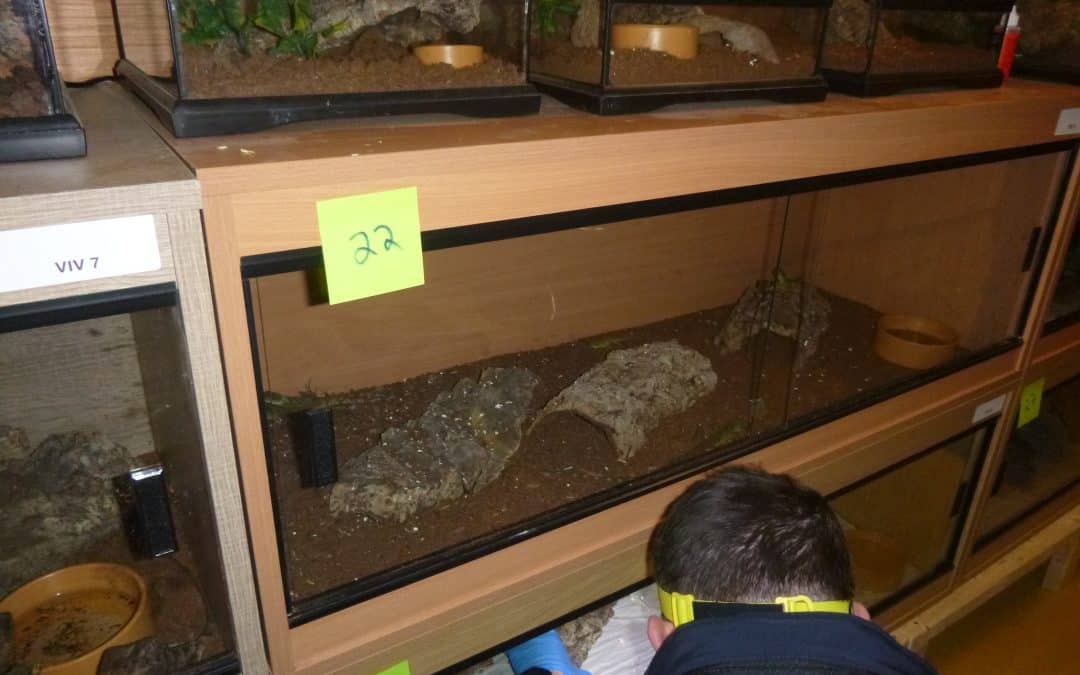A man has been sentenced for his involvement in a case involving 1,800 exotic animals – one of the biggest exotics operations the RSPCA has investigated.
The case – known as Operation Herald – followed warrants which were executed by West Mercia Police at four addresses on 10 December 2020.
Together with police, RSPCA officers and exotic specialist vets – led and organised by RSPCA Inspector Kate Parker – 1,870 live animals were removed along with 31 dead animals. Most animals were removed from Cosford Grange Farm Shop, Holyhead Road, Albrighton, while 73 Hermann’s tortoises were found at Senorita Sparkles, Station Road, Newport, Shropshire.
Following a lengthy legal process, sentencing for the final defendant involved in this case has now concluded at Shrewsbury Crown Court. Each of the four defendants faced different offences relating to exotic animals involved within the case.
David Neville Johnson (d.o.b 12/01/1988) of Silvercroft Street, Manchester, pleaded guilty to nine offences under the Animal Welfare Act.
One charge was pleaded to on 4 October 2022 at Telford Magistrates’ Court, the other eight offences were pleaded to on 20 September 2023 at the court which was sitting in Birmingham at the time.
He was charged with failing to ensure the needs of 167 animals were met in terms of an appropriate environment, failing to ensure the needs of 83 animals in terms of their appropriate body condition, selling animals without a licence, failing to ensure the needs of 15 quail, a chicken, a monitor lizard and a crested gecko, were met in terms of an appropriate environment.
Other offences included causing unnecessary suffering to 83 animals by failing to investigate and address the causes of their poor bodily condition and weight loss, causing the unnecessary suffering to two African grey parrots and causing unnecessary suffering to 73 Hermann’s tortoises – along with failing to ensure their needs were met.
The final offence was causing the unnecessary suffering to 15 quail, by keeping the animals confined in a small enclosure which was overcrowded and without water.
On Thursday September 25 at Shrewsbury Crown Court Johnson was handed a suspended sentence for 24 weeks in total which was suspended for 18 months and he was disqualified from keeping all animals for 16 years.
He was ordered to undertake 125 hours of unpaid work and up to 20 Rehabilitation Activity Requirement days.
A Proceeds of Crime Act hearing for all defendants is yet to be concluded with Johnson’s hearing on 5 November.
In total 1,870 live animals at Cosford Grange Farm were seized by the police which included 1,061 Leopard Geckos, 294 Sulcata Tortoises, 18 Reticulated Pythons, 73 Leopard Tortoise, 22 Rose Belly Lizard, 14 Chinese Water Dragon, 47 Green Basilisks, 10 Smooth Helmeted Iguana and 73 Hermann’s tortoises- among many other exotic animals.
When RSPCA rescuers entered, they discovered cold animals, barely moving, including many dead.
In a written statement provided to the court by RSPCA Inspector Kate Parker she said that on 10 December 2020 she arrived at Cosford Grange Farm Shop along with West Mercia Police.
“I could instantly feel that it was cold inside. It was cold inside for any animal, let alone reptiles,” she said.
“I could see that from the many vivariums, tanks and tables there was not much movement, or immediately evident signs of life, from the animals inside. I could see that many of the set ups had equipment, such as heat lamps, designed for the keeping of reptiles, however the plugs were not plugged into the sockets, or those that were, had the switches off.
“From my initial observations, I saw some skeletons, decayed animals in vivs, dead tortoises and also some upside down tortoises.
“I was surprised by the low temperatures, as the equipment that was being used within the premises, including bulbs, strip lights and UV lights were of standard type for the upkeep of reptiles in a common setting, however they were not turned on, and the plug switches were off, with some plugs removed from the sockets themselves.”
She also found two African grey parrots housed in a metal cage too small to reasonably house two birds of their size, with a nest box on the side of it. The cage itself was filthy, with dried faeces and old dried food crusted on the bars and at the bottom of the cage and she noted some dirty water.
At another location in Wrockwardine 15 quail were found in very cramped conditions which was far too small for all of them and a single quail was found on its own in the corner of the kitchen being kept in what were two plastic containers put together under a heat lamp. There was no food or water in either of the quails enclosures.
A bantam chick was found in an improvised brooder (where chicks are kept warm) made of plastic tubs with a heat lamp turned on, there was no water available and food, bedding and faeces were mixed together on the floor. A juvenile monitor lizard was found in a cold small plastic tub without food or water and a crested gecko was found in a glass vivarium on top of a wardrobe. The temperature of 17C was too low, the animal was thin and no food was available.
While 73 Hermann’s tortoises were found at Senorita Sparkles, Station Road, Newport, (pictured below) by police in a back office area. They were contained in three boxes that were stacked – each one containing tortoises. The tortoises were hardly moving and had no food or water present in the shavings. A vet examined these tortoises and said they were suffering predominantly due to dehydration.
The animals involved in the operation were then transported to vets for immediate treatment and subsequently transferred to boarding establishments and RSPCA centres/branches around the country. Sadly 399 animals died or were euthanized after they were removed on welfare grounds due to their poor conditions.
Commenting on the case after sentencing, RSPCA Lead Exotics Officer, Inspector Kim Greaves, said: “This case was certainly one of the biggest exotics cases I’ve seen as an Inspector.
“There were dead and dying animals and it was incredibly sad to see such beautiful animals in these conditions. These animals were then sold on to unsuspecting individuals and the pet trade, who probably had no clue they were being kept like this.
“This was a complex and distressing operation involving around 30 RSPCA officers – including six exotic officers – along with two vets who were exotic specialists. The operation went on for the entire day, with officers drafted in to collect animals and transport them to other locations.
“I was very proud of the exotic officers, and indeed all the Inspectorate as it was a gruelling day but everyone worked hard to achieve and secure the best outcome. A personal thank you to Phil Hamilton from the RSPCA’s veterinary team whose work on the day was invaluable helping to arrange places for the animals to go.”
Following the hearing, RSPCA Chief Inspector for the charity’s Special Operation Unit, William Mitchell, said: “This was a massive operation for the RSPCA and I would like to thank the many rescue officers and Inspectors who worked tirelessly on rescuing these animals, as well as the vets and exotics specialists who took on these animals for boarding at short notice.
“In particular RSPCA Inspector Kate Parker worked tirelessly co-ordinating the operation and investigation and this case has been a result of her commitment and hard work.
“Sadly a number of these exotics animals died or have been put to sleep to prevent suffering. Exotic animals have very specific needs and sadly in this case these animals were not cared for appropriately.
“Reptiles may look resilient and tough on the outside but they are actually completely reliant on their owners to provide the correct environment for the species, including heating and lighting, and an appropriate diet – all of which are essential to keep them healthy and allow them to carry out their natural behaviour. Without proper care they become ill or suffer and, in severe cases or if left untreated, they can die.
“We would like to thank West Mercia Police, National Wildlife Crime Unit, Telford and Wrekin Council and the private exotic vets for their support and expertise on this case.”
The majority of the exotics seized went into private boarding arranged by the RSPCA and when they were signed over officially to the care of the RSPCA a large number of the exotics stayed with the private boarder, who then rehomed them.
Other exotics went to RSPCA Brighton and RSPCA Stubbington Ark (RSPCA Solent Branch CIO). RSPCA Reptile Rescue in Brighton took on nearly 400 animals, including 138 leopard geckos, around 200 invertebrates and many other snakes and lizards.
The animals received the veterinary care they needed and many have now found new homes.
For advice and guidance on caring for lizards and other exotic pets, please visit the RSPCA’s exotics web page: http://www.rspca.org.uk/adviceandwelfare/pets/other.
Three other defendants have already received sentences as part of this case.

